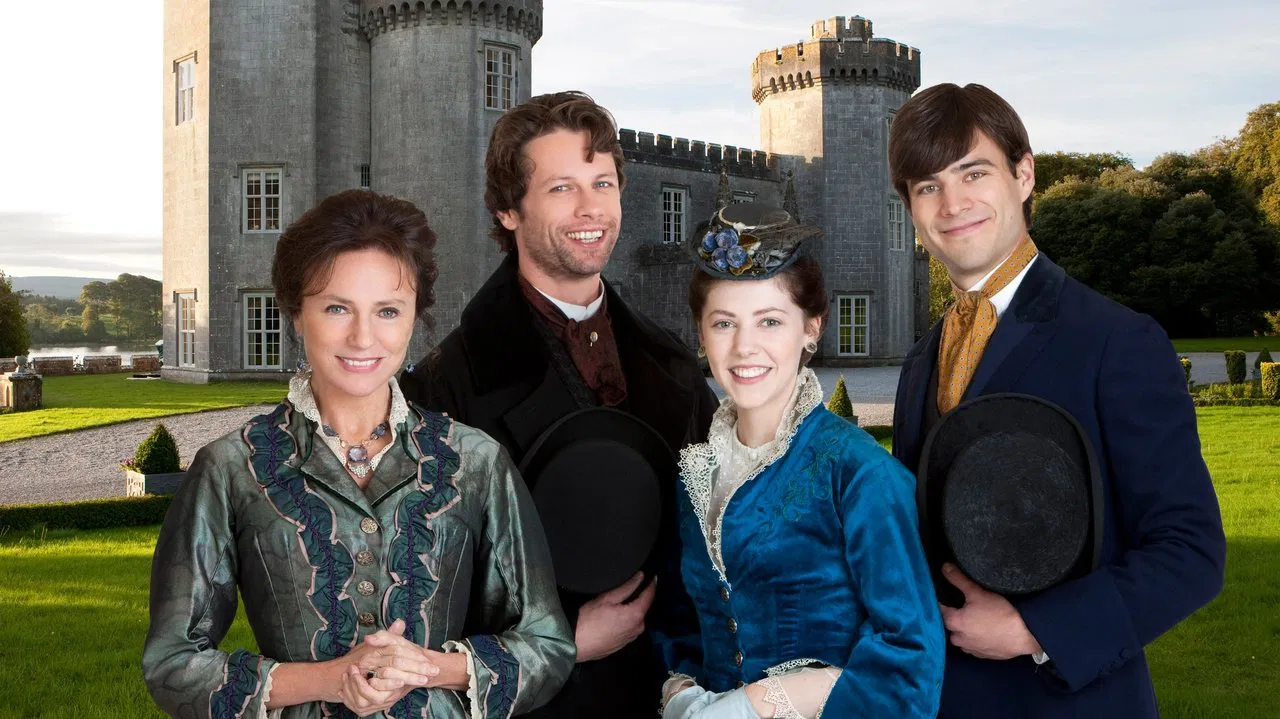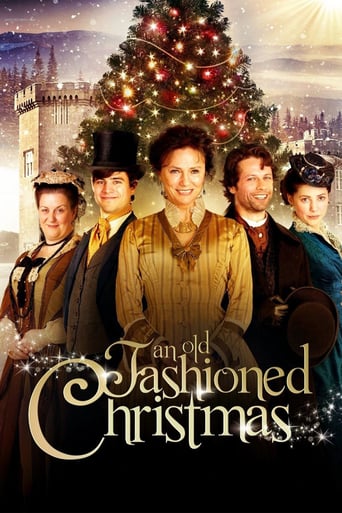

Waste of time
... View MoreThis Movie Can Only Be Described With One Word.
... View MoreI am only giving this movie a 1 for the great cast, though I can't imagine what any of them were thinking. This movie was horrible
... View MoreUnshakable, witty and deeply felt, the film will be paying emotional dividends for a long, long time.
... View MoreDecember 1870, and we pick up on the adventures of Mathilda "Tilly" Bassett and her rich grandmother Isabella, having toured some of Europe's cultural centers and are now arriving in Dublin for a month-long stay. Tilly's inner struggle is between being a society woman in-the-making and the Yankee farm girl that are her roots.Isabella's mission is to expose Tilly to the world of letters; that's why she's bringing her to Dublin, to meet Ireland's poet laureate, the Earl of Shannon. But there's a saying throughout Ireland: "If you want to make God laugh, try making plans."This film is very good. You should watch it but without distractions. It will be slow for someone that expects "Vampires and Hobbits". This is a gentle film that lets an audience take in the surroundings and environment. It also a film about the "old country vs the new country". It also makes you think at what "really matters". It questions what is most important. The questions include Whats Important 1) What people expect from you 2) what do you expect of yourself 3)Should you always follow your heart? Watch and enjoy
... View MoreThe other brief reviews do not make clear what this film is about: period drama, in a Henry James, or Merchant-Ivory way. "An Old Fashioned Christmas" is a SEQUEL to 'An Old Fashioned Thanksgiving' which is set in the latter 1800s, a while after the American Civil War, and based (apparently only VERY LOOSELY based, using the title, the character-names and general setting, but with a strong period feeling of Alcott!) on a short story by Louisa May Alcott (the famous author of 'Little Women'), in which a daughter and estranged mother argue over family ties. The Amazon (USA) plot summary says: 'Isabella Caldwell is a high-society woman in late-1800s New York. When Isabella's estranged daughter Mary becomes ill and is too proud to ask her mother for assistance, Mary's daughter, Tilly, takes it upon herself to contact her grandmother and plead for help. Isabella's arrival causes an upheaval in many lives, but may also lead to reconciliation within the family.' One reviewer adds: '(include) a little romance, a disapproving neighbour, sisterly jealousy, a scandalous past, poverty, scarlet fever, and a rambunctious little boy, all woven around the Thanksgiving season and you have a story that will hold your interest. In one scene the young widow accuses her mother of having married her father (who was quite a bit older) for his money and only had a child (herself) so that his older children from a previous marriage could not contest the will.' Both films star Jacqueline Bisset as the grandmother, Isabella, and Kristopher Turner as Gad, the love-interest for Tilly. Most reviewers prefer the 'Thanksgiving' film. 'An Old Fashioned Christmas' happens to be set around Christmas, and ends with a Christmas dinner and includes some carol singing (including "Jingle Bells" that had not been written at this time!), although NOT the Christmas dinner that had been planned. (However this is a green-leafed, sunshine-filled summery version of late-December in rainy Dublin: the film was NOT made in the actual season. Alas.) But the story is NOT about Christmas. Instead it is a Henry James-like tale of American wealth, democracy, and no-nonsense, versus traditional British, classism, complicated by an Irish setting. Wealthy American grandmother, Isabella, invites herself to visit and spend Christmas with the Earl of Shannon, the Irish Poet Laureate. She hopes he can help her granddaughter, Matilda, known as Tilly, progress in her attempts to become a writer. Unfortunately, the Poet Laureate has suffered a stroke, and although his intentions are good, he is unable to do or say much. He spends his time sitting and reading, and making quiet negative noises about his scheming wife and rascal son. However, when Isabella shows some of Tilly's journals to the Earl, although at first he says he is unable to help her because he has lost contact with publishers, following his stroke, he recognises Tilly's talent as a writer, and gives his encouragement for her to pursue this as a serious career or vocation. (Tilly quotes poetry, and is besotted by Lord Byron's life and poetry. But it is not clear, apart from her travel journal, what she is writing, or might write.) The Earl's wife, Lady Shannon, however, has spent the Earl's money. She has accepted Isabelle's request to visit the Earl, and have Christmas at the castle, because she hopes that her handsome devil-may-care, wastrel, playboy son and heir will marry heiress Tilly, and her money will restore the fortune of the earldom. The earl's son tries to romance Tilly, and she finds him attractive. But she has been engaged for the last 2 years to an American, known as Gad, who has been patiently waiting for Tilly to end her European travels. Moreover, she is the daughter of Isabella's daughter and a stable boy, the (relatively) poor son of an Irish farmer. Angry that her daughter would marry for love, and marry beneath her social status, Isabella had cut all ties with her daughter and husband. But after the Irish husband dies, Isabella intervenes, taking young adult Tilly away on her Grand Tour. Tilly writes letters to her mother, in America, and hopes, while she is in Dublin, to find and meet her Irish grandfather, and establish a reconciliation between Isabella and her grandfather. With the help of the Earl's son, who has admitted his mother's would-be marriage schemes, this is (surprisingly easily) accomplished, but Isabella and the Irish grandfather quarrel. She thinks he is a mere farmer, and he blames her for being snobbish and hurting, instead of helping, his son and his family. Meanwhile, Tilly's American fiancé, Gad, is in Manchester, and, with some complications, is invited to spend Christmas in the Irish castle with the Earl. Rivalry quickly erupts between the Earl's son and Tilly's fiancé, and they come to blows. Tilly is unable to make up her mind, and the fiancé leaves. But with some encouragement from her Irish grandfather, Tilly speaks her mind to scheming Lady Shannon, resists the marriage proposal from the playboy son (who sees Tilly as a possible muse for his own writing, rather than wanting to encourage Tilly to be a writer), and the Christmas dinner is NOT at the castle but at the farm; not with the Earl's family, but with newly established warm feelings between Isabella and the grandfather, and with renewed marriage intentions between Tilly and her fiancé. A multiplicity of happy endings. John Gough (Deakin University – retired) jagough49@gmail.com
... View MoreI'll watch any old rubbish with Christmas in the title at this time of year and given that terrestrial TV here in the UK clogs up the afternoon schedules with wall-to-wall Christmas-themed movies, there's no shortage of choice.To be sure, the Christmas connection seemed somewhat contrived in this TV movie, the story could certainly have been played without the Yuletide reference, although other than having the characters sitting down to Christmas dinner singing carols to each other and a snow scene over the end titles, I didn't much get the spirit of the season anyway.The story was really just Mills and Boon set in old Ireland, the contrived plot revolving around a young American would-be writer, chaperoned around Ireland, by her stuffy, moneybags grandmother. The granddaughter wants to get back to her roots and track down her paternal Irish grandfather but along the way has to choose between her staid Stateside fiancé and the drunken but roguish native son pushed forward by the scheming Irish Lady of the manor, with whom they're both staying, the Lady hoping to trade a title for new money.The actors perform adequately as they wade through the schmaltz, but really this was a story better read than watched, if you like that kind of sub-Barbara Cartland thing.
... View MoreI know it's always hard to make a sequel - the fans of the first will be harsh critics - but it can be done fairly well. Sadly, this wasn't one of those times. They tried too hard to emphasize Isabella's being American. They should have left her accent alone (it was slight enough in the first that it was just assumed it was higher society). No offense to the woman who played Tilly this time but I much preferred the actress from the first. A shame they couldn't get her back. There was far too little Gad for my liking. And his competition? What competition? He was a jerk. They tried to play him off as a passionate alternative to Gad but trust me, if you saw the kiss in the first one you know Gad has plenty of passion when it comes to Tilly. The story they gave us could have worked but the final script just didn't cut it. The only redeeming quality of this film was Gad. He's the only reason I didn't give this film a rating of 1 for being awful. He seemed to be the only character who's development didn't get a complete reboot from the first. It wasn't the worst movie I've ever seen but I think I may stick with the first and pretend this one never happened. I'll write my own sequel for my amusement.EDIT: After writing this I went and watched the first one again. And just as I remember, it was wonderful. Checked and discovered this one had a different writer and director. I'm not saying they have no talent, I've never seen their other work, but they dropped the ball on this one.
... View More